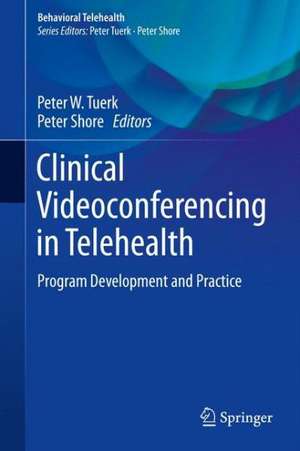Clinical Videoconferencing in Telehealth: Program Development and Practice: Behavioral Telehealth
Editat de Peter W. Tuerk, Peter Shoreen Limba Engleză Hardback – 5 ian 2015
Clinical Videoconferencing in Telehealth takes a comprehensive and vital step forward in providing mental health and primary care services for those who cannot make traditional office visits, live in remote areas, have transportation or mobility issues or have competing demands. Practical, evidence-based information is presented in a step by step format at two levels: for administrators, including information regarding selecting the right videoconferencing technology, navigating regulatory issues, policy temples, boilerplate language for entering into care agreements with other entities and practical solutions to multisite programming; and for clinicians, including protocols for safe, therapeutically sound practice, informed consent and tips for overcoming common technical barriers to communication in clinical videoconferencing contexts. Checklists, tables, templates, links, vignettes and other tools help to equip professional readers for providing safe services that are streamlined and relevant while avoiding guesswork, false starts and waste. The book takes a friendly-mentor approach to communication in areas such as:
Logistics for administrators:
- Clinical videoconferencing infrastructures and technologies
- Policy development, procedures and tools for responsible and compliant programming
- Navigating issues related to providing services in multiple locations
- The informed consent process in clinical videoconferencing
- Clinical assessment and safety planning for remote services
- Minimizing communication disruption and optimizing the therapeuticalliance
| Toate formatele și edițiile | Preț | Express |
|---|---|---|
| Paperback (1) | 841.18 lei 6-8 săpt. | |
| Springer International Publishing – 24 sep 2016 | 841.18 lei 6-8 săpt. | |
| Hardback (1) | 1163.74 lei 6-8 săpt. | |
| Springer International Publishing – 5 ian 2015 | 1163.74 lei 6-8 săpt. |
Preț: 1163.74 lei
Preț vechi: 1224.98 lei
-5% Nou
Puncte Express: 1746
Preț estimativ în valută:
222.71€ • 231.65$ • 183.86£
222.71€ • 231.65$ • 183.86£
Carte tipărită la comandă
Livrare economică 14-28 aprilie
Preluare comenzi: 021 569.72.76
Specificații
ISBN-13: 9783319087641
ISBN-10: 3319087649
Pagini: 300
Ilustrații: XXIII, 259 p. 8 illus.
Dimensiuni: 155 x 235 x 22 mm
Greutate: 0.58 kg
Ediția:2015
Editura: Springer International Publishing
Colecția Springer
Seria Behavioral Telehealth
Locul publicării:Cham, Switzerland
ISBN-10: 3319087649
Pagini: 300
Ilustrații: XXIII, 259 p. 8 illus.
Dimensiuni: 155 x 235 x 22 mm
Greutate: 0.58 kg
Ediția:2015
Editura: Springer International Publishing
Colecția Springer
Seria Behavioral Telehealth
Locul publicării:Cham, Switzerland
Public țintă
Professional/practitionerCuprins
Part I: Clinic Managers and Administrators: A Sequential Guide to Establishing Sustainable Programming: Technologies and Clinical Videoconferencing Infrastructures: A guide to selecting appropriate systems.- Conducting a Telehealth Needs Assessment.- Common Elements of the Expert Consensus Guidelines or Clinical Videoconferencing.- Policy Development, Procedures and Tools for Navigating Regulations.- Pulling it All Together: Logistics of Program Implementation.- Program Evaluation and Modification: Supporting Pragmatic and Data-Driven Clinical Videoconferencing (CV) Services.- Part II: For Clinicians: Clinical Standards and Protocols to Support Effective and Safe Intervention: The Informed Consent Process for Therapeutic Communication in Clinical Videoconferencing.- Patient Safety Planning and Emergency Management.- Clinical Assessment in Clinical Videoconferencing.- Therapeutic Alliance in Clinical Videoconferencing: Optimizing the Communication Context.
Notă biografică
Peter W. Tuerk, Ph.D. earned his degree in Clinical Psychology from the University of Virginia in 2007. He currently serves as Section Chief of the PTSD Clinical and Telehealth programs at the Ralph. H. Johnson VA Medical Center in Charleston, SC. Dr. Tuerk is an Associate Professor of Psychiatry and Behavioral Science within the Military Sciences Division at the Medical University of South Carolina where he serves as Director of Research Training for the APA approved psychology internship program. He conducts research focused on the integration of technology into normative mental health care settings and the enhancement of evidence-based treatments for PTSD and provides related clinical workshop trainings to VA and DoD providers. Dr. Tuerk has led and participated in a number of data-based local, national and international initiatives to develop and test the delivery of telehealth-oriented mental health services and Chaired the VA National Strategy Taskforce to Promote Evidence Based Treatments via Telehealth. He is the recipient of VA’s highest honor, the Olin E. Teague Award for career achievement “extraordinarily beneficial to the rehabilitation of war-injured veterans.” As a scientist-practitioner, he helped to test and disseminate the now common practice of conducting exposure therapy via clinical videoconferencing. Currently, as a front-line healthcare manager, his local clinical team provides care for and coordinates the logistics of roughly 1,000 home-based clinical videoconferencing encounters, annually and 4,000 annual office-based clinical videoconferencing encounters to 12 VA facilities and Community Based Outreach Clinics in 3 states, using hardware-based, software-based and mobile application-based technologies to promote access to care.
Peter Shore, Psy.D. is a licensed clinical psychologist and an Assistant Professor of Psychiatry in the Department of Psychiatry at Oregon Health and Science University. Dr.Shore is currently the VA Northwest Veterans Integrated Service Network (VISN 20) Director of Telehealth in the Department of Veterans Affairs. From 2011-2013, Dr. Shore was Program Manager, Web Services, Mental Health Services in VA’s Central Office. In 2012, Dr. Shore was awarded a VHA Innovation Award to expand the Home-Based Telemental Health pilot, which he implemented at the Portland VA in December 2009. In July 2013, Dr. Shore was the recipient of the James Besyner Early Career Award by the Association of VA Psychologist Leaders (AVAPL). As a nationally recognized subject matter expert in non-clinic based telehealth, Dr. Shore has been an invited speaker at national conferences and routinely consults on a variety of topics related to telehealth.
Peter Shore, Psy.D. is a licensed clinical psychologist and an Assistant Professor of Psychiatry in the Department of Psychiatry at Oregon Health and Science University. Dr.Shore is currently the VA Northwest Veterans Integrated Service Network (VISN 20) Director of Telehealth in the Department of Veterans Affairs. From 2011-2013, Dr. Shore was Program Manager, Web Services, Mental Health Services in VA’s Central Office. In 2012, Dr. Shore was awarded a VHA Innovation Award to expand the Home-Based Telemental Health pilot, which he implemented at the Portland VA in December 2009. In July 2013, Dr. Shore was the recipient of the James Besyner Early Career Award by the Association of VA Psychologist Leaders (AVAPL). As a nationally recognized subject matter expert in non-clinic based telehealth, Dr. Shore has been an invited speaker at national conferences and routinely consults on a variety of topics related to telehealth.
Textul de pe ultima copertă
Research findings and dissemination are making healthcare more effective. Electronic health records systems and advanced tools are making care delivery more efficient. Legislative reforms are striving to make care more affordable. Efforts still need to be focused on making healthcare more accessible.
Clinical Videoconferencing in Telehealth takes a comprehensive and vital step forward in providing mental health and primary care services for those who cannot make traditional office visits, live in remote areas, have transportation or mobility issues, or have competing demands. Practical, evidence-based information is presented in a step by step format at two levels: for administrators, including information regarding selecting the right videoconferencing technology, navigating regulatory issues, policy temples, boilerplate language for entering into care agreements with other entities, and practical solutions to multisite programming; and for clinicians, including protocols for safe, therapeutically sound practice, informed consent, and tips for overcoming common technical barriers to communication in clinical videoconferencing contexts. Checklists, tables, templates, links, vignettes and other tools help to equip professional readers for providing safe services that are streamlined and relevant while avoiding guesswork, false starts, and waste. The book takes a friendly-mentor approach to communication in areas such as:
Logistics for administrators:
Clinical Videoconferencing in Telehealth takes a comprehensive and vital step forward in providing mental health and primary care services for those who cannot make traditional office visits, live in remote areas, have transportation or mobility issues, or have competing demands. Practical, evidence-based information is presented in a step by step format at two levels: for administrators, including information regarding selecting the right videoconferencing technology, navigating regulatory issues, policy temples, boilerplate language for entering into care agreements with other entities, and practical solutions to multisite programming; and for clinicians, including protocols for safe, therapeutically sound practice, informed consent, and tips for overcoming common technical barriers to communication in clinical videoconferencing contexts. Checklists, tables, templates, links, vignettes and other tools help to equip professional readers for providing safe services that are streamlined and relevant while avoiding guesswork, false starts, and waste. The book takes a friendly-mentor approach to communication in areas such as:
Logistics for administrators:
- Clinical videoconferencing infrastructures and technologies
- Policy development, procedures, and tools for responsible and compliant programming
- Navigating issues related to providing services in multiple locations
- The informed consent process in clinical videoconferencing
- Clinical assessment and safety planning for remote services
- Minimizing communication disruption and optimizing thetherapeutic alliance
Caracteristici
Provides a well-organized, comprehensive, chronological resource for clinicians and clinical managers Focuses on information and tools specifically related to clinical videoconferencing programming Both editors have established clinical videoconferencing programs that serve as models throughout federal healthcare systems Includes supplementary material: sn.pub/extras











